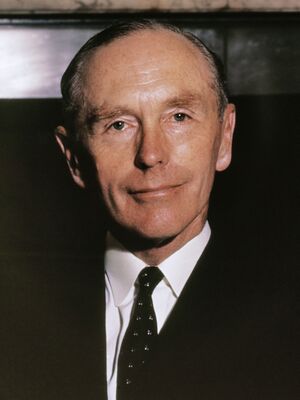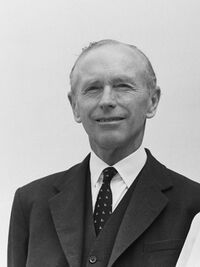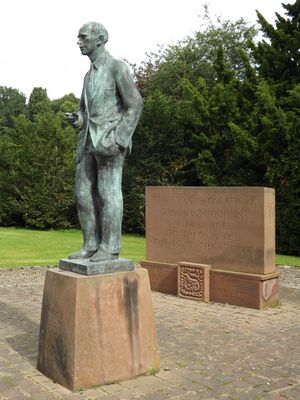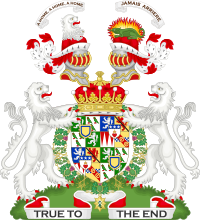ألك دوگلاس-هوم
The Lord Home of the Hirsel | |||||||||||||||||||||||||||||||||||||||||||||||||||||||||||||||||||
|---|---|---|---|---|---|---|---|---|---|---|---|---|---|---|---|---|---|---|---|---|---|---|---|---|---|---|---|---|---|---|---|---|---|---|---|---|---|---|---|---|---|---|---|---|---|---|---|---|---|---|---|---|---|---|---|---|---|---|---|---|---|---|---|---|---|---|---|
 Douglas-Home ح. 1963 | |||||||||||||||||||||||||||||||||||||||||||||||||||||||||||||||||||
| Prime Minister of the United Kingdom | |||||||||||||||||||||||||||||||||||||||||||||||||||||||||||||||||||
| في المنصب 19 October 1963 – 16 October 1964 | |||||||||||||||||||||||||||||||||||||||||||||||||||||||||||||||||||
| العاهل | Elizabeth II | ||||||||||||||||||||||||||||||||||||||||||||||||||||||||||||||||||
| سبقه | Harold Macmillan | ||||||||||||||||||||||||||||||||||||||||||||||||||||||||||||||||||
| خلـَفه | Harold Wilson | ||||||||||||||||||||||||||||||||||||||||||||||||||||||||||||||||||
| Leader of the Opposition | |||||||||||||||||||||||||||||||||||||||||||||||||||||||||||||||||||
| في المنصب 16 October 1964 – 28 July 1965 | |||||||||||||||||||||||||||||||||||||||||||||||||||||||||||||||||||
| العاهل | Elizabeth II | ||||||||||||||||||||||||||||||||||||||||||||||||||||||||||||||||||
| رئيس الوزراء | Harold Wilson | ||||||||||||||||||||||||||||||||||||||||||||||||||||||||||||||||||
| سبقه | Harold Wilson | ||||||||||||||||||||||||||||||||||||||||||||||||||||||||||||||||||
| خلـَفه | Edward Heath | ||||||||||||||||||||||||||||||||||||||||||||||||||||||||||||||||||
| Leader of the Conservative Party | |||||||||||||||||||||||||||||||||||||||||||||||||||||||||||||||||||
| في المنصب 18 October 1963 – 28 July 1965 | |||||||||||||||||||||||||||||||||||||||||||||||||||||||||||||||||||
| Chairman | |||||||||||||||||||||||||||||||||||||||||||||||||||||||||||||||||||
| سبقه | Harold Macmillan | ||||||||||||||||||||||||||||||||||||||||||||||||||||||||||||||||||
| خلـَفه | Edward Heath | ||||||||||||||||||||||||||||||||||||||||||||||||||||||||||||||||||
| |||||||||||||||||||||||||||||||||||||||||||||||||||||||||||||||||||
| تفاصيل شخصية | |||||||||||||||||||||||||||||||||||||||||||||||||||||||||||||||||||
| وُلِد | Alexander Frederick Douglas-Home 2 يوليو 1903 London, England | ||||||||||||||||||||||||||||||||||||||||||||||||||||||||||||||||||
| توفي | 9 أكتوبر 1995 (aged 92) Coldstream, Scotland | ||||||||||||||||||||||||||||||||||||||||||||||||||||||||||||||||||
| الحزب | Conservative | ||||||||||||||||||||||||||||||||||||||||||||||||||||||||||||||||||
| ارتباطات سياسية أخرى | Unionist | ||||||||||||||||||||||||||||||||||||||||||||||||||||||||||||||||||
| الزوج | |||||||||||||||||||||||||||||||||||||||||||||||||||||||||||||||||||
| الأنجال | 4, including David, 15th Earl of Home | ||||||||||||||||||||||||||||||||||||||||||||||||||||||||||||||||||
| الأب | Charles Douglas-Home, 13th Earl of Home | ||||||||||||||||||||||||||||||||||||||||||||||||||||||||||||||||||
| التعليم | Eton College | ||||||||||||||||||||||||||||||||||||||||||||||||||||||||||||||||||
| المدرسة الأم | Christ Church, Oxford (BA) | ||||||||||||||||||||||||||||||||||||||||||||||||||||||||||||||||||
| الخدمة العسكرية | |||||||||||||||||||||||||||||||||||||||||||||||||||||||||||||||||||
| الفرع/الخدمة | British Army | ||||||||||||||||||||||||||||||||||||||||||||||||||||||||||||||||||
| الرتبة | Major | ||||||||||||||||||||||||||||||||||||||||||||||||||||||||||||||||||
| الوحدة | Territorial Army | ||||||||||||||||||||||||||||||||||||||||||||||||||||||||||||||||||
| قاد | Lanarkshire Yeomanry | ||||||||||||||||||||||||||||||||||||||||||||||||||||||||||||||||||
| |||||||||||||||||||||||||||||||||||||||||||||||||||||||||||||||||||
ألكسندر فردريك دوگلاس-هوم، بارون بيت هيرسل Alexander Frederick Douglas-Home، KT, PC, JP, DL, , , , , , , , , , , , , , , , [1] ( /ˈhjuːm/; 2 July 1903 – 9 October 1995) was the Prime Minister of the United Kingdom from 1963 to 1964. He was the last British prime minister born during the Edwardian era, and the last to hold office while a member of the House of Lords, before disclaiming his peerage and taking up a seat in the House of Commons for the remainder of his premiership. His reputation, however, rests more on his two periods serving as Britain's foreign minister than on his brief premiership.
A talented cricketer, he played first-class cricket at club and county level; he began serving in the Territorial Army from 1924. Douglas-Home (under the courtesy title Lord Dunglass) entered Parliament in 1931 and served as Neville Chamberlain's parliamentary aide, although his diagnosis in 1940 with spinal tuberculosis would immobilise him for two years. Having recovered enough to resume his political career, Douglas-Home lost his seat to Labour at the 1945 general election. He regained it in 1950, but left the Commons the following year when, on the death of his father, he entered the Lords as the 14th Earl of Home. Under the next Conservative government, Home was appointed to increasingly senior posts, such as Leader of the House of Lords and Foreign Secretary. In the latter post (1960–1963) he supported United States resolve in the Cuban Missile Crisis and was a signatory of the Partial Nuclear Test Ban Treaty in August 1963.
In October 1963, Harold Macmillan resigned as prime minister and Douglas-Home was chosen to succeed him. By the 1960s, it was unacceptable for a prime minister to sit in the House of Lords, so Home disclaimed his hereditary peerage and successfully stood for election to Parliament as Sir Alec Douglas-Home. The manner of his appointment was controversial, and two Macmillan Cabinet ministers refused to stay in office under him. Criticised by the Labour Party as an out-of-touch aristocrat, he came over stiffly in television interviews, by contrast with Labour leader Harold Wilson. As prime minister, Douglas-Home's demeanour and appearance remained aristocratic and old-fashioned. His understanding of economics was primitive, and he gave his chancellor, Reginald Maudling, free rein to handle financial affairs. He enjoyed dealing with foreign policy and his foreign secretary, Rab Butler, was not especially energetic, but there were no major crises or issues to resolve.[n 1] The Conservative Party, having governed for nearly twelve years, lost its standing after the scandalous Profumo affair under Macmillan and, by Douglas-Home's premiership, seemed headed for heavy electoral defeat; his premiership was the second briefest of the twentieth century, lasting two days short of a year. Among the legislation passed under his government was the abolition of resale price maintenance in 1964.
Narrowly defeated in the 1964 general election, Douglas-Home resigned the party leadership in July 1965, having instituted a new and less secretive method for electing the leader. He later served in the Conservative Cabinet of Prime Minister Edward Heath at the Foreign and Commonwealth Office (1970–1974), an expanded version of his former secretaryship. After the first of the twin Conservative defeats of 1974, he stood down at the second, the October 1974 election, and returned to the Lords as a life peer titled Baron Home of the Hirsel. He gradually retired from front-line politics and died in 1995, aged 92.
. . . . . . . . . . . . . . . . . . . . . . . . . . . . . . . . . . . . . . . . . . . . . . . . . . . . . . . . . . . . . . . . . . . . . . . . . . . . . . . . . . . . . . . . . . . . . . . . . . . . . . . . . . . . . . . . . . . . . . . . . . . . . . . . . . . . . . . . . . . . . . . . . . . . . . . . . . . . . . . . . . . . . . . .
رئيس الوزراء (1963–1964)
| ||||||||||||||||
السمعة
Home's premiership was short and not conspicuous for radical innovation. Hurd remarks, "He was not capable of Macmillan's flights of imagination", but he was an effective practical politician.[3] At the Commonwealth Relations Office and the Foreign Office he played an important role in helping to manage Britain's transition from imperial power to European partner. Both Thorpe and Hurd quote a memo that Macmillan wrote in 1963, intended to help the Queen choose his successor:
Lord Home is clearly a man who represents the old governing class at its best ... He is not ambitious in the sense of wanting to scheme for power, although not foolish enough to resist honour when it comes to him ... He gives that impression by a curious mixture of great courtesy, and even if yielding to pressure, with underlying rigidity on matters of principle. It is interesting that he has proved himself so much liked by men like President Kennedy and Mr Rusk and Mr Gromyko. This is exactly the quality that the class to which he belongs have at their best because they think about the question under discussion and not about themselves.[4]
Douglas Hurd, once Home's private secretary, and many years later his successor (after seven intermediate holders of the post) as Foreign and Commonwealth Secretary, wrote this personal comment: "The three most courteous men I knew in politics were Lord Home, King Hussein of Jordan, and President Nelson Mandela. All three had ease of birth, in the sense that they never needed to worry about who they themselves were and so had more time to concern themselves with the feelings of others."[3]
Although some in the Conservative party agreed with Wilson (and Jo Grimond, the Liberal leader) that the Conservatives would have won the 1964 election if Butler had been prime minister, The Times observed, "it should not be overlooked that in October 1963 Home took over a Government whose morale was shattered and whose standing in the opinion polls was abysmal. A year later Labour won the general election, with an overall majority of only four seats. That [Home] recovered so much ground in so short a time was in itself an achievement." However, looking back across Home's career, The Times considered that his reputation rested not on his brief premiership, but on his two spells as Foreign Secretary: "He brought to the office ... his capacity for straight talking, for toughness towards the Soviet Union and for firmness (sometimes interpreted as a lack of sympathy) towards the countries of Africa and Asia. But he brought something else as well: an unusual degree of international respect."[5]
الوزارة (1963–1964)
The Home cabinet, announced on 20 October 1963, was:[6]
- Lord Home (Sir Alec Douglas-Home from 23 October): Prime Minister and First Lord of the Treasury
- R A Butler: Secretary of State for Foreign Affairs
- Quintin Hogg: Lord President of the Council and Minister for Science
- Lord Dilhorne: Lord Chancellor
- Reginald Maudling: Chancellor of the Exchequer[7]
- Henry Brooke: Secretary of State for the Home Department
- Duncan Sandys: Secretary of State for the Colonies and Secretary of State for Commonwealth Relations
- Edward Heath: Secretary of State for Industry, Trade, and Regional Development and President of the Board of Trade
- Peter Thorneycroft: Minister of Defence
- Selwyn Lloyd: Lord Privy Seal
- Lord Blakenham: Chancellor of the Duchy of Lancaster
- Christopher Soames: Minister of Agriculture, Fisheries and Food
- Ernest Marples: Minister of Transport
- John Boyd-Carpenter: Chief Secretary to the Treasury and Paymaster-General
- Michael Noble: Secretary of State for Scotland
- Sir Edward Boyle: Minister of Education
- Joseph Godber: Minister of Labour
- Sir Keith Joseph: Minister of Housing and Local Government and Minister for Welsh Affairs
- Frederick Erroll: Minister of Power
- Anthony Barber: Minister of Health
- Geoffrey Rippon: Minister of Public Building and Works
- W F Deedes: Minister without Portfolio
- Lord Carrington: Minister without Portfolio, Leader of the House of Lords
- التغييرات
- April 1964: Quintin Hogg became Secretary of State for Education and Science. Sir Edward Boyle left the cabinet. The post of Minister of Defence became Secretary of State for Defence with Thorneycroft retaining it.
الدروع
الملاحظات والمراجع
ملاحظات
- ^ Britain's application to join the European Economic Community had already been vetoed by French President Charles de Gaulle, the Cuban Missile Crisis had been resolved, and Berlin was again on the back burner. Decolonisation issues were largely routine, and the Rhodesian and South African crises lay in the future.
مراجع
- ^ Thorpe (1997), p. 134
- ^ Sir Alec Douglas-Home Memorial, Bill Scott Estate, http://billscottsculptor.co.uk/project/sir-alec-douglas-home/, retrieved on 5 February 2018
- ^ أ ب خطأ استشهاد: وسم
<ref>غير صحيح؛ لا نص تم توفيره للمراجع المسماةdnb - ^ Thorpe (1997), p. 301
- ^ خطأ استشهاد: وسم
<ref>غير صحيح؛ لا نص تم توفيره للمراجع المسماةtimesobit - ^ "Mr. Butler Appointed Foreign Secretary", The Times: 10, 21 October 1963
- ^ Dell, Edmund (1997), The Chancellors: A History of the Chancellors of the Exchequer, 1945–90, pp. 283–303
المصادر
- Chayes, Abram (1974), The Cuban Missile Crisis, International Crises and the Role of Law, New York: Oxford University Press, ISBN 0-19-519758-5, https://archive.org/details/cubanmissilecris00chay
- Churchill, Winston (1985), The Gathering Storm, New York: Houghton Miffin, ISBN 0-395-41055-X, https://archive.org/details/gatheringstorm00chur_0
- Connolly, Cyril (1961), Enemies of Promise, Harmondsworth: Penguin Books, OCLC 4377425
- Divine, Robert A. (1971), The Cuban Missile Crisis, Chicago: Quadrangle Books, ISBN 0-8129-0183-5, https://archive.org/details/unset0000unse_x1o4
- Dutton, David (2006), Douglas-Home, The 20 British Prime Ministers of the 20th Century, London: Haus Publishing, ISBN 1-904950-67-1
- Gromyko, Andrei (1989), Memoirs, London: Arrow Books, ISBN 0-09-968640-6
- Heath, Edward (1998), The Course of My Life – My Autobiography, London: Hodder and Stoughton, ISBN 0-340-70852-2
- Hennessy, Peter (2001), The Prime Minister – The Office and its Holders Since 1945, London: Penguin, ISBN 0-14-028393-5
- Home, Lord (1976), The Way the Wind Blows – An Autobiography, London: Collins, ISBN 0-00-211997-8, https://archive.org/details/waywindblows00home
- Home, Lord (1979), Border Reflections – Chiefly on the Arts of Shooting and Fishing, London: Collins, ISBN 0-00-216301-2
- Home, Lord (1983), Letters to a Grandson, London: Collins, ISBN 0-00-217061-2
- Howard, Anthony (1987), RAB – The Life of R A Butler, London: Jonathan Cape, ISBN 0-224-01862-0, https://archive.org/details/rablifeofrabutle0000howa
- Hutchinson, George (1980), The Last Edwardian at No 10 – An Impression of Harold Macmillan, London and New York: Quartet Books, ISBN 0-7043-2232-3, https://archive.org/details/lastedwardianatn0000hutc
- Ingrams, Richard (1971), The Life and Times of Private Eye, London: Penguin, ISBN 0-7139-0255-8
- Maitland, Donald (1996), Diverse Times, Sundry Places, Brighton: Alpha Press, ISBN 1-898595-17-8
- Newsom, David (2001), The Imperial Mantle, Bloomington: Indiana University Press, ISBN 0-253-10849-7, https://archive.org/details/imperialmantleun00news
- Oborne, Peter (2004), Basil D'Oliveira. Cricket and Conspiracy: The Untold Story, London: Little, Brown, ISBN 0-316-72572-2
- Pike, E. Royston (1968), Britain's Prime Ministers, London: Odhams, ISBN 0-600-72032-2
- Pimlott, Ben (1992), Harold Wilson, London: Harper Collins, ISBN 0-00-215189-8
- Roth, Andrew (1972), Heath and the Heathmen, London: Routledge and Keegan Paul, ISBN 0-7100-7428-X, https://archive.org/details/heathheathmen0000roth
- Thomas-Symonds, Niklaus (2010), Attlee – A Life in Politics, London: Tauris, ISBN 978-1-84511-779-5
- Thorpe, D. R. (1997), Alec Douglas-Home, London: Sinclair-Stevenson, ISBN 1-85619-663-1
- Thorpe, D. R. (2010), Supermac – The Life of Harold MacMillan, London: Chatto and Windus, ISBN 978-0-7011-7748-5
- Wilby, Peter (2006), Anthony Eden, The 20 British Prime Ministers of the 20th Century, London: Haus Publishing, ISBN 1-904950-65-5
- Wilson, Geoffrey (1976), Cases and Materials on Constitutional and Administrative Law, Cambridge: Cambridge University Press, ISBN 0-521-20816-5
- Young, John W. (2007), "International Factors and the 1964 Election", Contemporary British History 21 (3): 351–371, doi:, https://nottingham-repository.worktribe.com/output/2482263, retrieved on 29 March 2021
- Young, Kenneth (1970), Sir Alec Douglas-Home, London: Dent, OCLC 471161294
. . . . . . . . . . . . . . . . . . . . . . . . . . . . . . . . . . . . . . . . . . . . . . . . . . . . . . . . . . . . . . . . . . . . . . . . . . . . . . . . . . . . . . . . . . . . . . . . . . . . . . . . . . . . . . . . . . . . . . . . . . . . . . . . . . . . . . . . . . . . . . . . . . . . . . . . . . . . . . . . . . . . . . . .
Further reading
- Dickie, John (1964), The Uncommon Commoner – A Study of Sir Alec Douglas-Home, London: Pall Mall Press, OCLC 1525498, https://archive.org/details/uncommoncommoner0000dick
- Grant, Matthew (2003), "Historians, the Penguin Specials and the 'State-of-the-Nation' Literature, 1958-64", Contemporary British History 17 (3): 29–54, focus on decline of Britain
- Douglas-Home, Alec (1964), Eldon Griffiths, ed., Peaceful Change – A selection of speeches, London: Barker, OCLC 165151
- Holt, Andrew (2005), "Lord Home and Anglo–American Relations, 1961–1963", Diplomacy & Statecraft 15 (4): 699–722, doi:, http://eprints.nottingham.ac.uk/1555/, retrieved on 5 December 2020
- Holt, Andrew (2014), The Foreign Policy of the Douglas-Home Government: Britain, the United States and the End of Empire, Basingstoke: Palgrave Macmillan, ISBN 978-1-137-28440-2
- Hughes, Emrys (1964), Sir Alec Douglas-Home, London: Housman's, OCLC 9464208
- Lomas, Charles W. (1970), "Sir Alec Douglas home: Case study in rhetorical failure", Quarterly Journal of Speech 56 (3): 296–303, doi:, argues that Home's sincerity and simplicity could not overcome the amateurish ineptitude of his delivery
وصلات خارجية
- Hansard 1803–2005: contributions in Parliament by Lord Home of the Hirsel
- Lord Dunglass (Alec Douglas-Home) CricketArchive
- Prime Ministers in the Post-War world: Alec Douglas-Home, lecture by D. R. Thorpe at Gresham College, 24 May 2007 (available for download as an audio or video file)
- قالب:NPG name
- قالب:UK National Archives ID
- Works by ألك دوگلاس-هوم at LibriVox (public domain audiobooks)

- Short description is different from Wikidata
- Articles with hatnote templates targeting a nonexistent page
- Missing redirects
- Use British English from January 2013
- Use dmy dates from August 2015
- مواليد 1903
- وفيات 1995
- 20th-century prime ministers of the United Kingdom
- Alumni of Christ Church, Oxford
- British Secretaries of State for Foreign Affairs
- British Secretaries of State for Foreign and Commonwealth Affairs
- British sportsperson-politicians
- Chairmen of the Steering Committee of the Bilderberg Group
- Conservative Party (UK) life peers
- Conservative Party prime ministers of the United Kingdom
- Directors of the Bank of Scotland
- Earls of Home
- English cricketers of 1919 to 1945
- English cricketers
- English people of Scottish descent
- Free Foresters cricketers
- H. D. G. Leveson Gower's XI cricketers
- Harlequins cricketers
- Knights of the Thistle
- Leaders of the Conservative Party (UK)
- Leaders of the House of Lords
- Lord Presidents of the Council
- Marylebone Cricket Club cricketers
- Members of the Parliament of the United Kingdom for Scottish constituencies
- Members of the Privy Council of the United Kingdom
- Members of the Steering Committee of the Bilderberg Group
- Middlesex cricketers
- Ministers in the Churchill caretaker government, 1945
- Ministers in the Eden government, 1955–1957
- Ministers in the Macmillan and Douglas-Home governments, 1957–1964
- Ministers in the third Churchill government, 1951–1955
- Oxford University cricketers
- Parliamentary Private Secretaries to the Prime Minister
- People associated with Perth and Kinross
- People educated at Eton College
- People from Mayfair
- Politicians awarded knighthoods
- Presidents of the Marylebone Cricket Club
- Scottish Conservative Party MPs
- Scottish Episcopalians
- UK MPs 1931–1935
- UK MPs 1935–1945
- UK MPs 1950–1951
- UK MPs 1959–1964
- UK MPs 1964–1966
- UK MPs 1966–1970
- UK MPs 1970–1974
- UK MPs 1974
- UK MPs who inherited peerages
- UK MPs who were granted peerages
- Unionist Party (Scotland) MPs
- 20th-century British businesspeople
- Children of peers and peeresses created life peers
- People educated at Ludgrove School
- Home family




